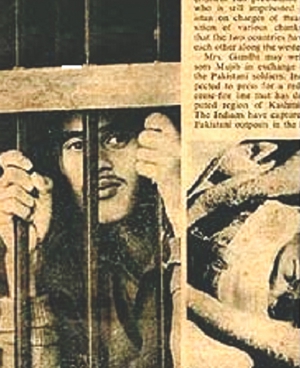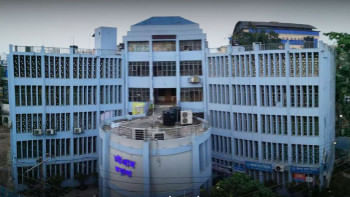When tears run dry

Nilanjana Ghosh Stanley was aged 35 and eight-month pregnant when she got to know that the person she knew all along as her father was indeed her stepfather.
A photograph published in a Time magazine issue of December 1971 introduced her with her biological father, Major Ashok Ghosh, who had been reported missing in India's efforts to help Bangladesh achieve freedom.
To her, childhood and youth were not a fond memory having less cared or somehow neglected by the high-handed father [stepfather]. But it had all been part of the reality tied with her life but now everything seemed a big lie that she was not being able to fathom.
The photograph, she got in 2005, shows a man behind the bars of a Pakistani jail.
Her mother had been quite successful in keeping her oblivious of her roots, but as she finally got to know her real identity desperation overwhelmed her to learn more about her father -- whether he was still alive and was languishing in a Pakistani jail as a prisoner of war (POW).
In her search for her father, she stumbled upon families that had been trying to reach other missing defence personnel for more than three decades. Evidence turned up time and again of Indian POWs in Pakistan but the Pakistan government denied holding them in its custody.
These facts, however, could not stop Nilanjana's endeavour to get her father back. She instead joined hands with the other families to compel both the sides to come to an agreement on repatriation of their loved ones.
In October 2006, Nilanjana, a software engineer, wrote to Amnesty International, pleading with it to negotiate Ashok's release with Pakistan.
Major Ashok of 15th Rajput Battalion was captured while he was defending India's borders in the Fazilka Theatre of Operations in Punjab.
In a recent article in a magazine named Fried Eye, Nilanjana unfolded her anguish of having a fatherless childhood and waiting for her father in uncertainty.
She is now divorced and has been raising her eight-year-old daughter without any support of a family. She might fear seeing a reflection of her in her daughter who also does not have her father beside her.
Fried Eye publishes a picture of a baby Nilanjana in her parents' arms. But she cannot recall being held by him in that early age.
In the dead of night she wakes up and talks to her father in the picture.
“Where are you, I ask him‚ can you not hear me weep?”
“How can you? You are a picture, a name, a rank. They say the walls of your prison are so thick that the sound of my crying does not reach you. It is said to be so damp that my tears get lost.”


 For all latest news, follow The Daily Star's Google News channel.
For all latest news, follow The Daily Star's Google News channel. 



Comments